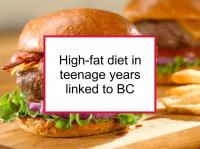A new study has reported that high fat intake during adolescence is associated with an elevated risk of breast cancer in adulthood. Adolescence may be a period of heightened susceptibility to some breast cancer risk factors. It is possible that some dietary risk factors are more important during early life than later in adulthood.
The study included 39,268 initially cancer-free premenopausal women in the Nurses' Health Study II. In 1998 (at which time they were 34 to 53 years of age), the women completed a 124-item food frequency questionnaire concerning their diet during high school. A total of 455 cases of invasive breast cancer were found in this group between 1998 and 2005.
Women in the highest fifth of adolescent fat consumption were found to have a 35% higher risk of premenopausal breast cancer than women in the lowest fifth of fat consumption. The results did not depend on the type of fat consumed during adolescence, i.e., whether the fat was saturated, monounsaturated, polyunsaturated, or trans fats. Furthermore, milk, total dairy, carbohydrate intake, glycemic load of diet, and fiber consumed during adolescence were not found to be related to breast cancer incidence. The authors conclude that dietary fat consumed during adolescence may be associated with an elevated risk of breast cancer. They caution that further studies to assess this relationship among postmenopausal women, and to confirm these results in premenopausal women, are needed.
Implications of the study results
A previous 2008 study published by the same authors concerning the same study participants and time period reported that higher red meat consumption during adolescence may increase the risk of hormone receptor positive premenopausal breast cancer. Studies of adolescent diet and breast cancer all suffer from recall bias since they rely on the recollection of adults (in this case, women at least 34 years old) concerning diet during the teenage years. There is also the problem of the poor overall quality of the diet of U.S. teenagers, which could tend to mask the possible beneficial effects of food components seldom consumed by them.
Taken at face value, the study would appear to suggest that teenagers should feel free to load up on low-fiber, high carbohydrate foods, and ignore the type of fat consumed, as long as they keep the overall level of fat low. This would be in keeping with the observation that heavier weight in childhood and teenage years is associated with lower risk of premenopausal breast cancer, but would be detrimental for the overall health of our daughters and sons. For more detailed discussions of diet and other factors during adolescence, please see our articles on how to protect our teenage daughters and sons from breast cancer.
